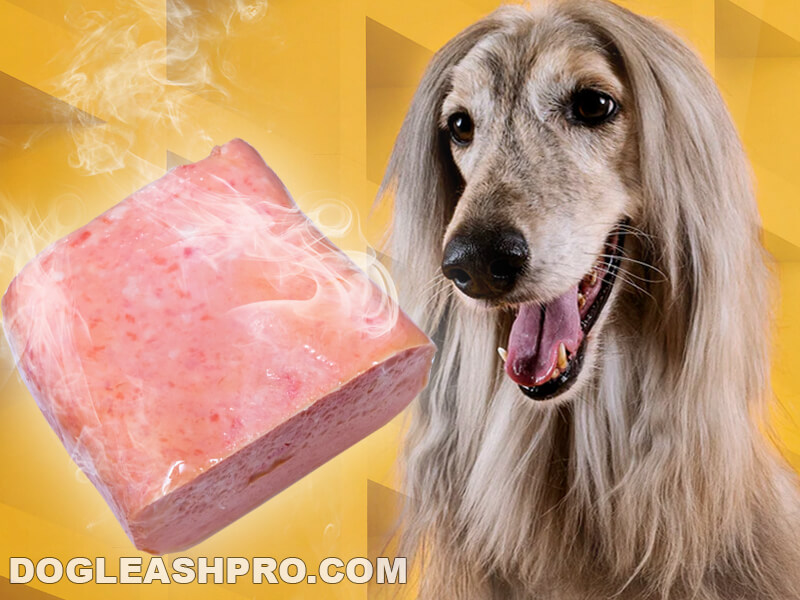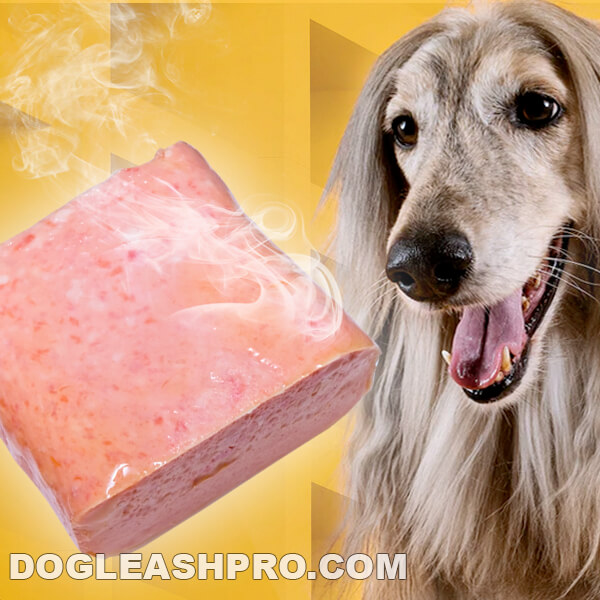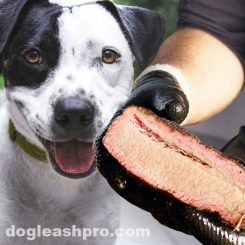
Yesterday, I brought home a few cans of spam, and immediately my dogs ran over and started sniffing them. But, can dogs eat Spam? In this article, we’ll discuss everything you need to know about this salty meat called Spam before you let your precious pooch eat them.
Can dogs eat Spam? No, dogs should not eat Spam. Spam is highly processed and contains high amounts of salt, sugar, and carbohydrates. In one can of Spam, there are more than 1,000 calories. All of these combinations can wreak havoc on your dog’s overall health.
Let’s dive deeper to understand why dog owners should not share Spam with their four-legged friends and how accidentally eating a can of Spam can negatively harm our furry friend’s health.
Table of Contents
Can dogs have Spam?
No, dogs should not have Spam. Spam is considered an “empty calories” food and it does not provide any nutritional benefits to our canine friends. To understand why let’s take a look at what Spam is.
What is Spam made of?

Spam came about during World World 2. It was one of the most affordable ways to feed thousands of soldiers.
Spam is a highly processed meat that is made from a combination of the following ingredients:
- Ham.
- Ground pork.
- Sugar.
- Salt.
- Spices.
- Potato starch.
- Sodium Nitrite.
Is Spam good for dogs?
No, Spam is not good for dogs. Can dogs eat Spam meat? While the Spam meat is fine, it’s the other ingredients in the can of Spam that makes it harmful to our pooch.
Let’s go over each of the ingredients to find out why.
Ham is safe for dogs to eat
Ham is generally fine for dogs to eat. In fact, it is one of many great protein sources for dogs. However, the ham is very salty because there is a high salt content in the ham. This makes the ham in the Spam can unsafe for doggy consumption.
Ground pork is safe for dogs to eat
Like ham, ground pork is also safe for doggy consumption. However, since it is also very salty due to the high amount of salt in the ground pork, it’s not safe for dogs to eat.
Fun Fact: The well-known Pepperoni is also made out of pork. Check out our article, Can Dogs Eat Pepperoni? to learn if Pepperoni is safe for dogs.
High amount of Salt in Spam is harmful to a dog’s health
Speaking of salt, there is 790mg of sodium in a can of Spam. If a dog accidentally ate a whole can of Spam, he may be at risk of sodium-ion poisoning. Keep in mind that a dog that weighs 33 pounds should only consume 100mg of salt daily and no more than that. A can of Spam is over the daily recommended salt intake for dogs by almost 8 times!
Be sure to provide a bowl of fresh cool water nearby if your pooch accidentally ate the whole can of Spam. Water is one of the first ways to fight against the effects of salt poisoning.
However, if you were not aware that your four-legged friends got into one of the Spam can in a short amount of time and no water was provided or there’s no water available, your pups may experience the following signs and symptoms of salt poisoning:
- Vomiting.
- Nausea.
- Swollen tongue.
- Diarrhea.
- Extreme thirst.
- Frequent urination.
- Fainting.
- Lethargy.
- Very tired.
- Walking drunk.
- Loss of appetite.
- Upset stomach or stomach pains.
- Irregular fluid accumulation within the dog’s body.
- Kidney failure.
- Muscle tremor or hypernatremia.
- Muscle spasms.
- Headache or dizziness.
- Breathing difficulty or respiratory distress.
- Fast heartbeat or tachycardia.
- Confusion.
- Seizure (in severe cases).
- Coma (in severe cases).
Handy Hint: Dogs can walk like they are intoxicated if they consume too much salt. There are also other reasons why dogs may act drunk and wobbly. To learn more, check out My Dog Is Acting Drunk And Wobbly Should I Be Concerned?
Our canine friends can get a headache or dizziness or seizure from salt poisoning because the brain cells are destroyed due to the lack of water, which can cause these neurological symptoms.
The muscle tremor or hypernatremia occurs when there’s just a lot of salt in the blood and this causes the dog’s muscle to lose moisture. When this happens, the muscle becomes very stiff and it will wrinkle and contract. All of this causes the muscle to jerk and shake violently.
While all this sounds scary, it’s the neurological symptoms that are the most severe because that can cause coma and convulsions.
Be sure to contact your vet immediately as soon as you find out that your pooch consumes a whole can of Spam or if you suspect that your pup has salt poisoning. Time is of the essence as the sooner your dog can get back to staying hydrated the better. Your vet will be able to keep your dog hydrated using IV fluids or other methods.
High amount of Sugar in Spam is harmful to dogs’ health
There is 1 gram of sugar in a can of Spam. Our canine friends actually do not need sugar from their food or treats. Consuming too much sugar can cause weight gain, blood sugar spikes or diabetes, dental issues, and even pancreatitis in dogs.
Consuming too much sugar can cause cavities as well as plaque and tartar buildup in dogs. Excess sugar consumption is awful to dogs because the bacteria in their mouth use sugar to produce more acid and these acids can break down the minerals in your dog’s enamel, which can lead to dental issues in dogs.
When dogs ingest too much sugar, they can get an upset stomach and as a result, they will either vomit or have bloody or explosive diarrhea.
Handy Hint: Your dog’s vomit texture and color and can tell you a lot about why they are puking. If your dog is throwing up and you don’t know why, take a look at the color of their vomit and check out Dog Vomit Color Guide to find out what’s causing your dog to vomit.
Sodium nitrite can cause blood disorders in dogs if consumed in high doses
Many dog food actually uses sodium nitrite as an additive or a preservative. In high doses, sodium nitrite is harmful to dogs. If dogs consume more than 7.9 and 19.8 kg/mg of sodium nitrite each day, they can get methaemoglobin or a blood disorder.
Potato starch does not provide any nutritional benefit to dogs
When it comes to potato starch, there is a huge difference between potato starch and whole potatoes. Let’s go over the differences real quick:
Whole potatoes are great for dogs as they provide potassium which is essential to maintaining well-balanced blood pressure and prevent cardiovascular disease in dogs.
Potato starch, on the other hand, is highly processed and is a by-product of potato processing. It’s actually used as a binding agent in many dog foods. Potato starch provides very little nutritional value to our furry friends and only increases their carbohydrates intake.
The potato skin usually contains many of the vitamins and minerals that are beneficial for dogs. But since the potato skin is removed, your pooch will just be ingesting high carbs and very little to no nutritional value from it. This is considered empty calories – increasing calorie intake while not benefitting from the food itself.
Handy Hint: If you’re looking to make dog treats for your pooch and you prefer a healthy and safe alternative to grain, try using amaranth flour. Check out Can Dogs Eat Amaranth? to learn why amaranth is a great gluten-free alternative to grain or starch flour.
Is Spam bad for dogs?

As you can see, Spam is bad for dogs. It’s best for dog owners to avoid feeding their canine family members Spam at all costs. While the ground pork and ham are generally safe for doggy consumption, they are doused in salt which then makes them dangerous for our K9 pals.
Our four-legged friends are extremely sensitive to salt and if they accidentally ate the whole can of Spam in a short period of time, they are at risk of salt toxicity. Be sure to contact your vet if your suspect your dog is not feeling well and have sodium-ion poisoning.
We advise that dog owners do not feed them dogs food products with potato starch in them. Potato starch in Spam is used as a filler to give the highly processed spam its bulky shape.
It’s best to stay away from potato starch because it’s pretty much a source of empty calories and only causes your furry pals to gain weight and be at risk of diabetes or heart disease.
High calories in one can of Spam
We’ve mentioned before that in one can of Spam, there are more than 1,000 calories. The actual amount of calories in one can of Spam is actually 1,080 calories! That’s a lot of empty calories for a dog.
Can dogs eat cooked Spam?
No, dogs should not eat cooked Spam. It doesn’t matter how you cook the Spam, it will still contain high amounts of salt in it which is very dangerous to dogs. Due to this, it’s best to avoid feeding your canine friends any cooked Spam.
Can dogs eat Spam raw?
No, dogs should not eat Spam raw. Raw Spam contains a high amount of salt which is harmful to your dog’s health. Spam, whether raw or cooked, contains potato starch as one of its ingredients which is high in carbohydrates and it doesn’t provide any nutritional values to dogs other than being used as a cheap filler to make the Spam its bulk and fullness.
Eating Spam, cooked or raw, only causes weight gain, diabetes, and tons of other health problems in dogs.
Is Spam dog food?
As you can see, Spam is not dog food. Spam is made for human consumption only. It also contains additives and preservatives such as sodium nitrates that are not good for your dog’s health. Spam is a highly processed food that has a high salt and carbohydrates content. None of this is good for your K9 pals.
So, Can Dogs Eat Spam?
Absolutely, not. Dogs should not eat Spam. If you have Spam in your cupboard or you’re about to use it for a dish, we highly recommend that you do not feed it to your precious pooch.
Our furry family members will eat anything you give them, including food that is not healthy or safe for them. When dogs get their nose on the Spam, they don’t know that it is high in salt and carbohydrates which are bad for them. All they see and smell is the meat.
However, as responsible dog owners, we need to avoid feeding them Spam as we know it is not healthy for dogs due to the high content of salt, sugar, carbohydrates, and calories in it.
DISCLAIMER: THIS WEBSITE DOES NOT PROVIDE MEDICAL ADVICE
The information, including but not limited to, text, graphics, images and other material contained on this website are for informational purposes only. No material on this site is intended to be a substitute for professional veterinary advice, diagnosis, or treatment. Always seek the advice of your veterinarian or other qualified health care provider with any questions you may have regarding dietary needs.
SPAM is a registered trademark of Hormel Foods, LLC. Dogleashpro does not claim any ownership of the SPAM name, logo, or any identifying mark in any way. This article is for educational purposes only.
Resources:
https://en.wikipedia.org/wiki/Spam_(food)
https://www.nap.edu/resource/10668/dog_nutrition_final_fix.pdf

With over five years of specialized experience as an animal writer, my expertise lies in dog nutrition, health, behavior, grooming, and training. I am dedicated to delivering helpful and informative content that caters to the well-being of our furry friends. My primary goal is to empower pet owners with knowledge and ensure our canine companions thrive in health and happiness. In my free time, I love volunteering at local dog rescue centers.







